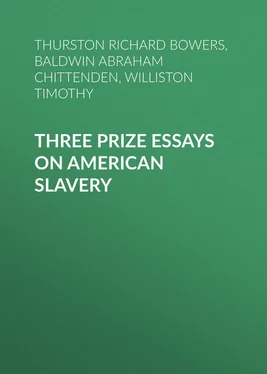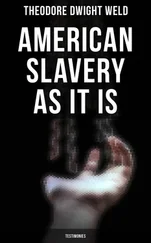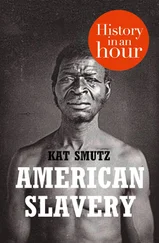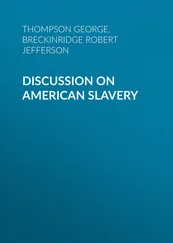Timothy Williston - Three Prize Essays on American Slavery
Здесь есть возможность читать онлайн «Timothy Williston - Three Prize Essays on American Slavery» — ознакомительный отрывок электронной книги совершенно бесплатно, а после прочтения отрывка купить полную версию. В некоторых случаях можно слушать аудио, скачать через торрент в формате fb2 и присутствует краткое содержание. ISBN: , Жанр: foreign_antique, foreign_prose, на английском языке. Описание произведения, (предисловие) а так же отзывы посетителей доступны на портале библиотеки ЛибКат.
- Название:Three Prize Essays on American Slavery
- Автор:
- Жанр:
- Год:неизвестен
- ISBN:http://www.gutenberg.org/ebooks/32422
- Рейтинг книги:5 / 5. Голосов: 1
-
Избранное:Добавить в избранное
- Отзывы:
-
Ваша оценка:
- 100
- 1
- 2
- 3
- 4
- 5
Three Prize Essays on American Slavery: краткое содержание, описание и аннотация
Предлагаем к чтению аннотацию, описание, краткое содержание или предисловие (зависит от того, что написал сам автор книги «Three Prize Essays on American Slavery»). Если вы не нашли необходимую информацию о книге — напишите в комментариях, мы постараемся отыскать её.
Three Prize Essays on American Slavery — читать онлайн ознакомительный отрывок
Ниже представлен текст книги, разбитый по страницам. Система сохранения места последней прочитанной страницы, позволяет с удобством читать онлайн бесплатно книгу «Three Prize Essays on American Slavery», без необходимости каждый раз заново искать на чём Вы остановились. Поставьте закладку, и сможете в любой момент перейти на страницу, на которой закончили чтение.
Интервал:
Закладка:
Another example. The New Testament explicitly commands citizens to submit to the civil power. Does this sanctify the tyranny of a Nero or a Nicholas? In the enjoined submission of subjects, has the despot, or the state, full license for edicts and acts of oppression and iniquity? Yet they are logically compelled to admit this, and thus, in theory at least, banish freedom from the whole earth, who find in commands addressed to servants power conferred on legislators and masters to make them slaves; that is, to hold them as property. Instead of this, the rights and obligations of rulers, and of those who claim to be owners of their fellow men, are defined in a very different class of instructions.
Secondly, the instructions addressed to masters forbid the exercise of the right which is assumed in slavery. To make this clear, we observe, primarily, there is no passage in the New Testament which institutes the relation of men held in ownership by men. There is no direct reference to the civil laws which constituted this relation. They are passed by silently, as are the laws that established idolatry, and kindled the fires of persecution. Their existence is tacitly acknowledged in the use of the terms which designate masters and servants; and that is all. Hence those who find here an apology for slavery are obliged to refer to secular history for the facts and definitions on which their argument rests. Accordingly, no passage in the New Testament would be void of meaning, though slavery should cease. In this respect the Constitution of the United States resembles the sacred books; for not one word of that instrument, interpreted on just principles as the palladium of liberty, needs to be obliterated in the abolition of slavery. Furthermore, and this covers our position, the New Testament, disregarding the Roman law, refers masters exclusively to the law of God as their rule for the treatment of servants. A single citation, with which all passages agree, is sufficient to show this. "Masters, give unto your servants that which is just and equal, knowing that ye also have a Master in heaven." Now, as none can find in such precepts a right to destroy God's primary institution concerning the family, no more can they find in them a right to destroy his primary and universal institution concerning property. Stronger than this, the conclusion is inevitable, that the very precepts which are relied upon to support American slavery do condemn and destroy it; for the law of God, by which they bind masters, ordaining from Eden what is just and equal between men, abolishes the fundamental and central law of the system. 3 3 Col. 4:1; "Ye masters, give unto your servants that which is just and equal." That is, act towards them on the principles of justice and equity. Justice requires that all their rights, as men, as husbands, and as parents, should be regarded. And these rights are not to be determined by the civil law, but by the law of God… But God concedes nothing to the master beyond what the law of love allows. Paul requires for servants not only what is strictly just, but τὴν ἰσότητα. What is that? Literally, it is equality . This is not only its signification, but its meaning. Servants are to be treated by their masters on the principles of equality. Not that they are to be equal with their masters in authority or station or circumstances; but that they are to be treated as having, as men, as husbands, and as parents, equal rights with their masters. It is just as great a sin to deprive a servant of the just recompense for his labor, or to keep him in ignorance, or to take from him his wife or child, as it is to act thus towards a free man. This is the equality which the law of God demands, and on this principle the final judgment is to be administered. Christ will punish the master for defrauding the servant as severely as he will punish the servant for robbing his master. The same penalty will be inflicted for the violation of the conjugal or parental rights of the one as of the other. For, as the apostle adds, there is no respect of persons with him. At his bar the question will be, "What was done?" not "Who did it?" Paul carries this so far as to apply the principle not only to the acts, but to the temper of masters. They are not only to act towards their servants on the principles of justice and equity, but are to avoid threatening . This includes all manifestation of contempt and ill temper, or undue severity. All this is enforced by the consideration that masters have a Master in heaven, to whom they are responsible for their treatment of their servants… Believers will act in conformity with the Gospel in this. And the result of such obedience, if it could become general, would be, that first the evils of slavery, and then slavery itself, would pass away naturally, and as healthfully as children cease to be minors. Prof. Hodge's Commentary.
It is argued, indeed, that slavery is right, because masters, as well as fathers and rulers, may require obedience. The argument fails utterly; for there is at the foundation no analogy in the cases. The family and the State are divine institutions, having sanction in the Bible; but slavery subverts a divine institution. Fathers and rulers, as such , have duties and rights suitable to the relations they sustain by the will of God. Masters, as such , have no rights ; for their relation, as holding property in men, is contrary to his will. Their duty, to which they are bound by the solemn consideration that he is their Master, is practically to restore to their servants the rights which he confers upon all; for nothing less than this can be just and equal in his sight.
This view discloses the harmony of the whole Bible concerning slavery; and, in the light of the two Testaments, the institution stands as a legalized violation of the positive will of Jehovah.
We now condense the whole argument into its briefest form, in the following syllogisms.
The entire right of men to hold property is given by the Creator. He gives to American States and citizens no right to hold property in men. Therefore they have no such right.
Again. An institution is sinful, which, without divine warrant, holds property in men, thus assuming a divine prerogative, and subverting a divine institution. American slavery does this. Therefore it is a sinful institution.
The purpose of this tract now introduces a new series of topics. The argument demands its application; and the exigencies of the times present momentous questions, which it must answer.
Hitherto we have spoken of the system of slavery. We come now to persons connected with it. Because the system is sinful, the question immediately occurs, who are chargeable with the sin; for there is no sin without sinners. The answer is obvious. They are chargeable who founded it, and all who wilfully implicate themselves with it. Practically, they are always chargeable who adopt it as their own in theory and practice, who support it in the State, consecrate it in the Church, and labor for its extension. They are chargeable, for they bring heresy into creeds, unrighteousness into legislation, and crime into popular usage. If they are masters, they stand in the same moral relations with persecutors and tyrannical rulers, guilty for all personal injuries they inflict under color of unjust laws; and, whether masters or not, they are guilty for exerting their influence to sustain laws which set aside the authority of God, and withhold the rights he has given. Such men are accountable to God and to society for deliberate, organised, aggressive iniquity. The "organic sin" of the State is their sin, the sin of each in his own measure; for they are the individuals who determine the acts and the character of the slave-holding State as such.
But are there no exceptions among slave-holders? We trust there are many. There is a plain distinction between wicked laws and the personal acts of men who live under those laws. Some may approve them, and use or abuse them to the injury of their fellow men. Others may disapprove them, and refuse, by means of them, to do or justify a wrong. Christians may become in a legal sense owners of slaves, while they heartily deprecate the system of oppression, while they are ready to unite with good men in feasible and wise measures for its removal, and while they obey the Christian precepts towards their servants, rendering unto them what is just and equal to men and brethren in Christ. Such Christians and such men do not hold slaves in the sense which God forbids; and they cannot be charged with the wickedness of laws by which they, as well as the slaves, are oppressed. On their estates a higher law than that of slavery has sway. To them their slaves, though legally property, are morally and actually men. The Bible sustains their position. They are the Philemons to whom Paul gives fellowship, and Onesimus returns, not as a slave, but a brother beloved. In the trials of their situation they should receive the cordial sympathy of Christians everywhere. It is, indeed, to their sound convictions and their political influence the world must look, in part at least, for the ultimate, peaceful extinction of American slavery. Without them, what would the South become? With the Scriptures in our hand we earnestly say to them, "Throw the weight of your influence against unrighteous laws, fulfil to servants the law of God, and you shall have the sympathy and confidence of good men everywhere. Nay, more; you, with their help, and they with your help, will confine the spreading curse, till, with God's blessing, it shall cease; and Christian and civilized man shall have no more communion with it."
Читать дальшеИнтервал:
Закладка:
Похожие книги на «Three Prize Essays on American Slavery»
Представляем Вашему вниманию похожие книги на «Three Prize Essays on American Slavery» списком для выбора. Мы отобрали схожую по названию и смыслу литературу в надежде предоставить читателям больше вариантов отыскать новые, интересные, ещё непрочитанные произведения.
Обсуждение, отзывы о книге «Three Prize Essays on American Slavery» и просто собственные мнения читателей. Оставьте ваши комментарии, напишите, что Вы думаете о произведении, его смысле или главных героях. Укажите что конкретно понравилось, а что нет, и почему Вы так считаете.












